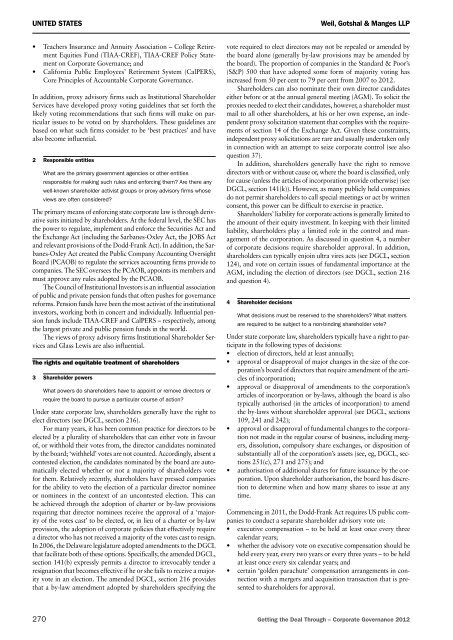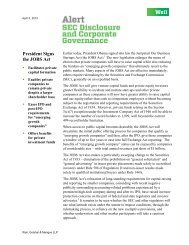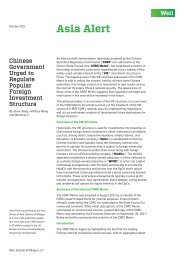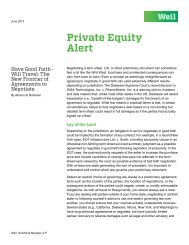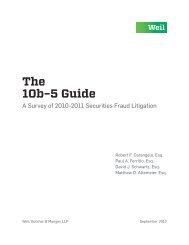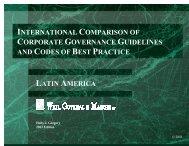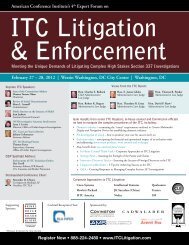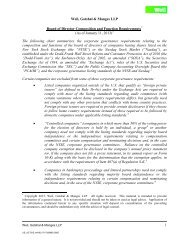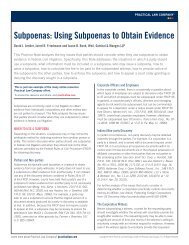Corporate Governance - Weil, Gotshal & Manges
Corporate Governance - Weil, Gotshal & Manges
Corporate Governance - Weil, Gotshal & Manges
Create successful ePaper yourself
Turn your PDF publications into a flip-book with our unique Google optimized e-Paper software.
United States<br />
<strong>Weil</strong>, <strong>Gotshal</strong> & <strong>Manges</strong> LLP<br />
• Teachers Insurance and Annuity Association – College Retirement<br />
Equities Fund (TIAA-CREF), TIAA-CREF Policy Statement<br />
on <strong>Corporate</strong> <strong>Governance</strong>; and<br />
• California Public Employees’ Retirement System (CalPERS),<br />
Core Principles of Accountable <strong>Corporate</strong> <strong>Governance</strong>.<br />
In addition, proxy advisory firms such as Institutional Shareholder<br />
Services have developed proxy voting guidelines that set forth the<br />
likely voting recommendations that such firms will make on particular<br />
issues to be voted on by shareholders. These guidelines are<br />
based on what such firms consider to be ‘best practices’ and have<br />
also become influential.<br />
2 Responsible entities<br />
What are the primary government agencies or other entities<br />
responsible for making such rules and enforcing them Are there any<br />
well-known shareholder activist groups or proxy advisory firms whose<br />
views are often considered<br />
The primary means of enforcing state corporate law is through derivative<br />
suits initiated by shareholders. At the federal level, the SEC has<br />
the power to regulate, implement and enforce the Securities Act and<br />
the Exchange Act (including the Sarbanes-Oxley Act, the JOBS Act<br />
and relevant provisions of the Dodd-Frank Act). In addition, the Sarbanes-Oxley<br />
Act created the Public Company Accounting Oversight<br />
Board (PCAOB) to regulate the services accounting firms provide to<br />
companies. The SEC oversees the PCAOB, appoints its members and<br />
must approve any rules adopted by the PCAOB.<br />
The Council of Institutional Investors is an influential association<br />
of public and private pension funds that often pushes for governance<br />
reforms. Pension funds have been the most activist of the institutional<br />
investors, working both in concert and individually. Influential pension<br />
funds include TIAA-CREF and CalPERS – respectively, among<br />
the largest private and public pension funds in the world.<br />
The views of proxy advisory firms Institutional Shareholder Services<br />
and Glass Lewis are also influential.<br />
The rights and equitable treatment of shareholders<br />
3 Shareholder powers<br />
What powers do shareholders have to appoint or remove directors or<br />
require the board to pursue a particular course of action<br />
Under state corporate law, shareholders generally have the right to<br />
elect directors (see DGCL, section 216).<br />
For many years, it has been common practice for directors to be<br />
elected by a plurality of shareholders that can either vote in favour<br />
of, or withhold their votes from, the director candidates nominated<br />
by the board; ‘withheld’ votes are not counted. Accordingly, absent a<br />
contested election, the candidates nominated by the board are automatically<br />
elected whether or not a majority of shareholders vote<br />
for them. Relatively recently, shareholders have pressed companies<br />
for the ability to veto the election of a particular director nominee<br />
or nominees in the context of an uncontested election. This can<br />
be achieved through the adoption of charter or by-law provisions<br />
requiring that director nominees receive the approval of a ‘majority<br />
of the votes cast’ to be elected, or, in lieu of a charter or by-law<br />
provision, the adoption of corporate policies that effectively require<br />
a director who has not received a majority of the votes cast to resign.<br />
In 2006, the Delaware legislature adopted amendments to the DGCL<br />
that facilitate both of these options. Specifically, the amended DGCL,<br />
section 141(b) expressly permits a director to irrevocably tender a<br />
resignation that becomes effective if he or she fails to receive a majority<br />
vote in an election. The amended DGCL, section 216 provides<br />
that a by-law amendment adopted by shareholders specifying the<br />
vote required to elect directors may not be repealed or amended by<br />
the board alone (generally by-law provisions may be amended by<br />
the board). The proportion of companies in the Standard & Poor’s<br />
(S&P) 500 that have adopted some form of majority voting has<br />
increased from 50 per cent to 79 per cent from 2007 to 2012.<br />
Shareholders can also nominate their own director candidates<br />
either before or at the annual general meeting (AGM). To solicit the<br />
proxies needed to elect their candidates, however, a shareholder must<br />
mail to all other shareholders, at his or her own expense, an independent<br />
proxy solicitation statement that complies with the requirements<br />
of section 14 of the Exchange Act. Given these constraints,<br />
independent proxy solicitations are rare and usually undertaken only<br />
in connection with an attempt to seize corporate control (see also<br />
question 37).<br />
In addition, shareholders generally have the right to remove<br />
directors with or without cause or, where the board is classified, only<br />
for cause (unless the articles of incorporation provide otherwise) (see<br />
DGCL, section 141(k)). However, as many publicly held companies<br />
do not permit shareholders to call special meetings or act by written<br />
consent, this power can be difficult to exercise in practice.<br />
Shareholders’ liability for corporate actions is generally limited to<br />
the amount of their equity investment. In keeping with their limited<br />
liability, shareholders play a limited role in the control and management<br />
of the corporation. As discussed in question 4, a number<br />
of corporate decisions require shareholder approval. In addition,<br />
shareholders can typically enjoin ultra vires acts (see DGCL, section<br />
124), and vote on certain issues of fundamental importance at the<br />
AGM, including the election of directors (see DGCL, section 216<br />
and question 4).<br />
4 Shareholder decisions<br />
What decisions must be reserved to the shareholders What matters<br />
are required to be subject to a non-binding shareholder vote<br />
Under state corporate law, shareholders typically have a right to participate<br />
in the following types of decisions:<br />
• election of directors, held at least annually;<br />
• approval or disapproval of major changes in the size of the corporation’s<br />
board of directors that require amendment of the articles<br />
of incorporation;<br />
• approval or disapproval of amendments to the corporation’s<br />
articles of incorporation or by-laws, although the board is also<br />
typically authorised (in the articles of incorporation) to amend<br />
the by-laws without shareholder approval (see DGCL, sections<br />
109, 241 and 242);<br />
• approval or disapproval of fundamental changes to the corporation<br />
not made in the regular course of business, including mergers,<br />
dissolution, compulsory share exchanges, or disposition of<br />
substantially all of the corporation’s assets (see, eg, DGCL, sections<br />
251(c), 271 and 275); and<br />
• authorisation of additional shares for future issuance by the corporation.<br />
Upon shareholder authorisation, the board has discretion<br />
to determine when and how many shares to issue at any<br />
time.<br />
Commencing in 2011, the Dodd-Frank Act requires US public companies<br />
to conduct a separate shareholder advisory vote on:<br />
• executive compensation – to be held at least once every three<br />
calendar years;<br />
• whether the advisory vote on executive compensation should be<br />
held every year, every two years or every three years – to be held<br />
at least once every six calendar years; and<br />
• certain ‘golden parachute’ compensation arrangements in connection<br />
with a mergers and acquisition transaction that is presented<br />
to shareholders for approval.<br />
270 Getting the Deal Through – <strong>Corporate</strong> <strong>Governance</strong> 2012


